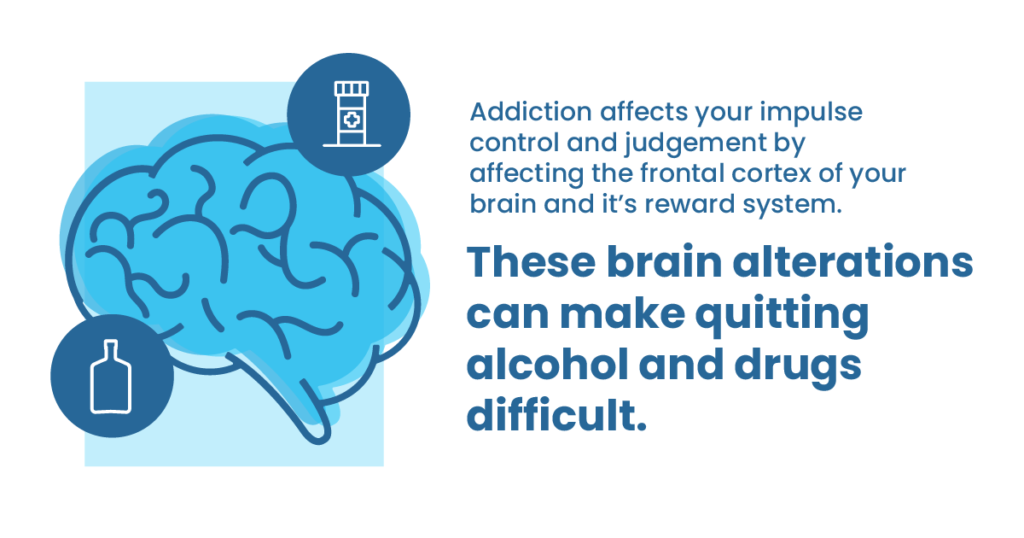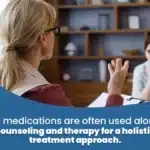
Drug and alcohol abuse is a dependency that affects an individual’s actions and behavior. It leads to substance use disorder (SUD), a brain disease that develops gradually and is not something a person chooses, just as they do not choose to get the flu, a stroke, or a heart attack. SUD requires treatment much like other chronic diseases. There is always the possibility of relapse, and the addict must fight hard to stay sober.
Once you decide to quit drinking and taking drugs, you must first recognize that you have a problem and that your addictive behaviors are affecting your life. After identifying the problem, you want to know how to quit your drug or alcohol addiction. Many people who have struggled with addiction are surprised at how tough it may be to quit. You may even question yourself, “Why can’t I quit?”
Why Addicts Can’t “Just Stop” on Their Own
Addiction affects your impulse control and judgment by affecting the frontal cortex of your brain. The brain’s reward system is also affected so that the memories of previous rewards might generate cravings or a greater “hunger” for drugs despite their harmful effects.
These brain alterations might make quitting drinking or taking drugs tough, but it is essential to remember that addictions are curable. Recovery is achievable with the proper plan and resources.
Although achieving sobriety is challenging, the good news is that you can quit.
What Quitting Drugs and Alcohol Feel Like?
When reducing or stopping drug and alcohol use, the body undergoes detoxification (detox) or withdrawal. Symptoms vary across individuals and drugs and range from minor to severe. Depending on the person, they can last anywhere from a few days to a few weeks, but they are temporary. At times, drug cravings will be faint, and at other times, they will be intense. To remain drug-free, it’s crucial to learn how to control them.
After withdrawal, there are still additional obstacles that make it difficult to remain “on the wagon.” According to National Institute on Drug Abuse (NIDA), the physical withdrawal symptoms often only last about a week, while psychological withdrawal symptoms can last longer.
How to Overcome Addiction?
Overcoming an addiction is a process that involves deciding to quit, planning how to quit, coping with withdrawal symptoms, and preventing relapse. Strategies for overcoming an addiction include:
- Consider what you need to do to overcome your addiction before quitting. This may involve removing triggers and seeking social support.
- If you are addicted to alcohol or drugs, there are medications that can help you quit safely and effectively. Discuss these choices with your doctor if you are planning to quit.
- Get rid of everything that might provoke a need or remind you of your addiction. In other instances, you may need to alter your habits or social patterns.
- Being busy can be an effective strategy to divert attention away from cravings and relapse temptations. Plan what you can do when cravings hit. For instance, you may take a stroll, read a book, watch a television program, or phone a friend.
- Discuss your goal with those closest to you and solicit their support. Knowing that there are people in your corner willing to assist you in overcoming the difficulties of quitting can boost your morale when you are experiencing problems.
Challenges When Quitting
Almost everyone who battles with substance abuse finds it challenging to quit. Relapsing into previous drinking patterns is often simpler than navigating the numerous obstacles that might occur when attempting to stop drinking or taking drugs.
Harmful substances, like alcohol, opioid, and heroin, has significant effects on the physical and mental elements of the body and brain. This implies that your body may experience significant physical symptoms when you attempt to quit.
In extreme instances, adverse effects such as seizures might be fatal. Always consult addiction counselors to evaluate if you are a good candidate for medically-supervised detoxification.
Frequently Asked Questions (FAQs)
Why is it hard to stay off drugs?
As the substance exits your system, your body begins to respond to the absence of alcohol or other substances. Withdrawal is often physically and mentally unpleasant and can occasionally be painful. Avoiding withdrawal symptoms is a powerful motivator for continued alcohol or drug use.
Is it possible to come out of addiction?
Despite the difficulty of addiction rehabilitation, addiction is curable. With the help of supportive resources and the appropriate addiction treatment program, you may overcome the physical and mental obstacles you face to recover from addiction.
How many months does it take to get rid of an addiction?
It takes 21 days to overcome an addiction. According to psychologists, while it takes around 21 days of conscious and continuous effort to form a new habit, it takes far longer to break an established one.
Why can’t people with substance addictions just quit?
Substances become the absolute center of an addict’s life. For an addict, everything revolves around substances. It is a mental health condition that must be addressed to the root. Otherwise, the addiction cycle doesn’t get broken.
What kind of mindset do you need to quit drug/alcohol addiction?
You need to sharpen your thinking when it comes to overcoming drug/alcohol dependency, as addiction is a severe condition that requires treatment. To overcome your drug or alcohol addiction, you must broaden your perspective, as many negative things surround you. It would help if you were prepared for all the hurtful remarks you may hear. You must have an open mind toward everyone.
Get Professional Help at The Haven Detox-South Florida
Unfortunately, overcoming addiction is not simple. Drug and alcohol addiction recovery is a lifetime journey. Quitting illegal drugs or alcohol will likely be one of the most challenging things you’ve ever done. You will likely require expert assistance if you wish to speed up your recovery.
At The Haven, we focus on giving each client the support and resources necessary for a successful recovery. Our team of highly competent medical staff offers emotional support and professional help to clients.
For more information, contact us at (561) 328-8627 today!






